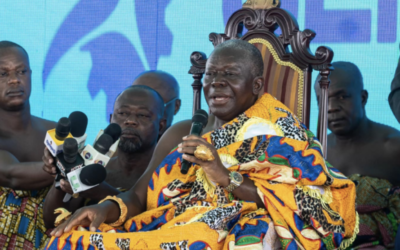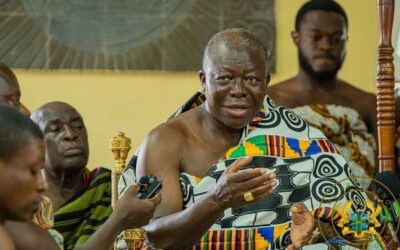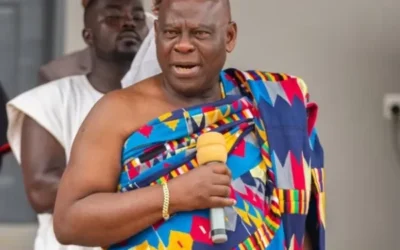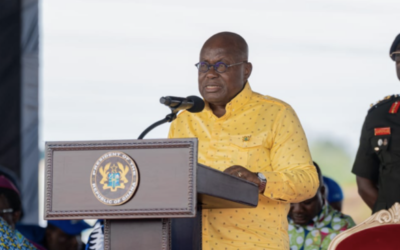The Supreme Court(SC), has upheld Appeal court’s ruling that sets aside 7th Day Pentecostal Assemblies elections, directs fresh elections within 6 months to elect new President according to the Church’s Constitution.
The Apex (SC) by a unanimous (5-0) decision thrown out Application for stay of execution by Micaiah Addai against the Court of Appeal decision, calling for an election to elect a new Leader of the Association of 7th Day Pentecostal Assemblies.
It would be recalled that Micaiah Addai first went to the Court of Appeal for stay of execution but lost the case last year and decided to take the matter to the Apex Court in the land (Supreme Court) but he has lost again.

Late Elder Enoch Ofori
Per the ruling of the Court,Micaiah Addai cannot hold himself as the President and that a new leader should be elected according to the Court of Appeal’s ruling.
The first page of certified true copy of the ruling dated 23-05-2023 signed by Registrar of Supreme Court Accra reads “In the Superior Court of Judicature in the Supreme Court Accra-A.D.2023:
CORAM: Dotse JSC(Presiding),Lovelace-Johnson(Mrs)JSC,Amadu JSC,Prof.Mensa-Bonsu(Mrs)JSC and Kulendi JSC
Micaiah Addai(Masquerading as the President of the Association of Seventh Day Pentecostal Assemblies) VS 1.Elder Enoch Ofor Jnr,2.Deacon Anthony Tachie.3.Deacon Yaw Sarfo Kantanka.4.Deacon Stephen Frimpong.
KULENDI JSC:INTRODUCTION: We have before us, an application for stay of execution of a Judgment of the Court of Appeal dated 28th April,2022 pending the final determination of an appeal lodged against the said judgment consequent upon a notice of appeal filed on 14th July,2022”.
BACKGROUND:
The circumstances that occasioned this application for a stay of the execution of the judgment of the Court of Appeal are that:
The parties are members of the Association of Seventh Day Pentecostal Assemblies.Upon the death of the President of the Assemblies,a tussle for leadership ensued between the Applicant and the 1st Respondent.This leadership tussle resulted in suit before the High Court which was amicably settled and the terms of settlement filled and adopted as a consent judgment.Under the consent judgement dated 15th May,2009,the Applicant was to act as the President of the Assemblies pending an election of a new President in accordance with the Constitution of the Assemblies.
However,as at January,2012,no elections were held to elect the President of the Assemblies.Consequently,the Respondents instituted a fresh action seeking among other reliefs,a declaration that the Applicant is not President of the Association.
The High Court dismissed the Respondents Suit but the Court of Appeal set aside the High Court judgment and ordered the Applicant to “convene a General Meeting of all the constituent Assemblies of the Association in Ghana within Six Months from the date of (the) judgment to elect a new President in accordance with the Constitution of the Seventh Day Pentecostal Assemblies” as was initially agreed and adopted as consent judgment in the earlier Suit.
Aggrieved by the decision of the Court of Appeal, the Applicant by a notice of appeal filed on 14th July,2022,has appealed to this Court and has mounted the present application for an order to stay the execution of the said judgment of the Court of Appeal.
In support of this Application, the Applicant has contended that there are exceptional circumstances warranting a grant of an order of stay of execution.
It is alleged that after the consent judgment, the Respondents formed a different group called the Seventh Day Pentecostal Church and have since not paid any dues to the Seventh Day Pentecostal Assemblies as required of every member who earns income under the constitution of the Assemblies.
Applicant also stated that irreparable harm would occasion him should the execution of the judgment not be stayed .It was contended that the Respondents who are no longer members of the Assemblies would be voting to elect a president of the Assemblies.
Applicant further contends that if they were to organize the elections as ordered by the Court of Appeal and his appeal subsequently succeeds, the elections, so organized would be rendered a “fruitless exercise” or in the alternative the successful appeal would be rendered nugatory.
The Respondents, in opposition to this application contend that the application is unmeritorious .They argue that the order is merely enforcing the consent judgment entered by the parties on 4th June,2009 and moreover that the election will be organized in accordance with the Constitution of the Assemblies.
Further, the Respondent submit that this application is intended to unduly delay the election so that the Applicant can continue to unlawfully occupy the position of President, notwithstanding the terms of the consent judgment”.
THE LAW:
Rule 20 of the Supreme Court Rules,1996©,provides as follows:”20.Effects of appeal .A civil appeal shall not operate as a stay of execution or of proceedings under the judgment or decision appealed against except in so far as the Court may otherwise order”.
The use of the word “may” connotes an exercise of discretion.Therefore,in applications for stay of execution,being an exercise of discretion, the bonafides and malafides of the parties cannot be ignored.
Thus,on the face of the deposition,an Applicant ought to be able to demonstrate that the case is not frivolous and that the prayer for an order for stay of execution is made in good faith and not intended to unduly confer a benefit whilst occasioning greater hardship to the Respondent.
In words of Straughton U in Linptype-Hell Finance Ltd V Baker(1992) 4 ALL ER 887,”Where an unsuccessful defendant seeks a stay of execution pending an appeal to the Court of Appeal,it is a legitimate ground for granting the application that the defendant is able to satisfy the Court that without a stay of execution he will be ruined and that he has an appeal which has some prospect of success”.(emphasis supplied)”.
Similarly, in the case of Joseph V Jebele & Anor.(1963)1 GLR 387,it was held as follows;”It is the paramount duty of a court to which an application for stay of execution pending appeal is made to see that the appeal ,if successful,is not nugatory .Wilson V.Church (No.2) (1879) 12 Ch.D.454 at pp.458-459 applied .”
Also,in the case of NDK Financial Services V Yiadom Construction & Electrical Works Ltd.(2007-2008) SCGLR93 the Court held as follows:
”The principles for considering an application for stay of execution pending appeal were well settled; the main principle adopted by the courts was what the position of the appellant would be if the judgment was to be enforced and the appeal was successful.In effect,the essential point in considering such application was whether the applicant would be returned to the status quo ante should the appeal succeed.
Another determining principle was which of the parties would suffer greater hardship should the application be granted or refused”.(See also:Republic v Court of Appeal,Accra;Ex-Parte Sidi (1997-88) 2 glr 170’Appiah v BBC Industrials Co(Ghana) Ltd & City Express Bus Services(2011) 2 SCGLR 8252) .
From the authorities above ,in considering whether or not to grant an application for stay of execution pending appeal ,this Court is minded to consider whether or not exceptional circumstances exist to warrant a grant of the order.
Although,the list of what Constitutes exceptional circumstances is in exhaustive,the following may serve as pointers;a.Has the Applicant mounted a valid appeal to this Court?’
b.Is the judgment sought to be stayed executable or does it have executable consequences?’
c.What is the likelihood of success of the Applicant’s appeal?In other words.whether the appeal is not frivolous ;
d.Will the subject –matter of the appeal be irretrievably lost should the appeal (which on the face of it is not frivolous) succeed? In other words.will the pending appeal or judgment be rendered nugatory if execution is not stayed; e.Has the Applicant demonstrated sufficient good faith and does the application for stay appear to be intended to enable the Applicant contest the appeal or it is for a collateral reason such as an undue advantage, overreaching or even to frustrate and /or deny the victorious party of the fruits of the judgment; f.Will the Applicant shall suffer irreparable loss, hardship, damage or injury if the execution of the judgment is not stayed?;g.On the balance of hardship, will the Applicant will suffer greater hardship than the Respondent if the execution of the judgment is not stayed.
The burden is thus on the Applicant to demonstrate the existence of these considerations which would amount to exceptional circumstances to motivate a determination of an application for an order for stay of execution pending appeal in the Applicant’s favour.
Portions of the Supreme Court ruling sub-headed “RESOLUTION” reads “We note that the Applicant has not been able to demonstrate that the pending appeal is not frivolous.
The only ground, per the notice of appeal, is the omnibus ground that the Judgment is against the weight of evidence. Given that the Judgment appealed against merely affirms a consent Judgment between the parties, the existence of which the Applicant does not deny, we are unable to appreciate the likelihood of success of an appeal lodged exclusively on the \basis of this omnibus ground.

Furthermore, the applicant has not been able to demonstrate any irreparable hardship that would occasion him by conducting the election.
This is because, the evidence shows that the party’s case is one of succession which is ably catered for by the Constitution of the Assemblies.
The Court’s order was for the election to be conducted in accordance with the Constitution of the Assemblies.
We see no irreparable damage in conducting an election pursuant to the dictates of the Assembly’s own Constitution and the parties’ own terms which they entered as a consent judgment .In any case, the Applicant has not demonstrated good faith to warrant a favourable exercise of discretion .Since the adoption of the consent judgment by the High Court, the Applicant has faithfully held unto the position of leader or President of the Church pending the holding of an election consequent upon the said judgment but rather curiously ,has consistently refused to hold elections in accordance with the sane consent judgment.
In the circumstances, we are constrained to say, with respect to the conduct of the Applicant, that such an approbation of a part of the consent judgment whilst reprobating the other part of the same judgment smacks of bad faith. Significantly ,the Applicant does not deny the fact that from 15th May,2009 till date, the Applicant though benefiting from the consent judgment as interim leader/president, has failed, neglected and/or refused to honour the other terms of the same consent judgment by conducting the elections as ordered by the Court of Appeal.
Needless to say, the consent judgment is a subsisting and valid judgment which has never been appealed since 2009 and therefore its consequences are inescapable”.
By Court:Upon reading the affidavit in support and in opposition to the motion, a thorough review of the annexures thereto,as well as carefully considering the submissions of both counsel,we are of the considered opinion that a proper case has not been made to motivate the exercise of our discretion in favour of the Applicant.
Accordingly, we dismiss the application for stay the execution as unmeritorious. Cost of five thousand Ghana cedis (Ghc5000.00) against the Applicant to the Respondent. E.YONNY KULENDI(JUSTICE OF THE SUPREME COURT),V.J.M.DOTSE(JUSTICE OF THE SUPREME COURT),A.LOVELACE-JOHNSON(MRS)(JUSTICE OF THE SUPREME COURT),I.O.TANKO AMADU(JUSTICE OF THE SUPREME COURT) AND PROF.H.J.N.MENSA-BONSU(MRS) (JUSTICE OF THE SUPREME COURT.
COUNSELKWAME ASIEDU-BASOAH ESQ,FOR THE DEFENDANT/RESPONDENT/APPELLANT/APPLICANT.CHARLES AGBANU ESQ.FOR THE PLAINTIFFS/APPELANTS/RESPONDENS/RESPONDENTS. source:tntnewspapergh.com














